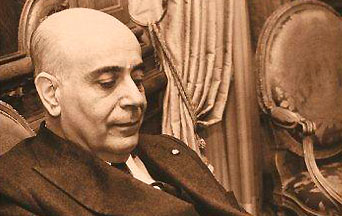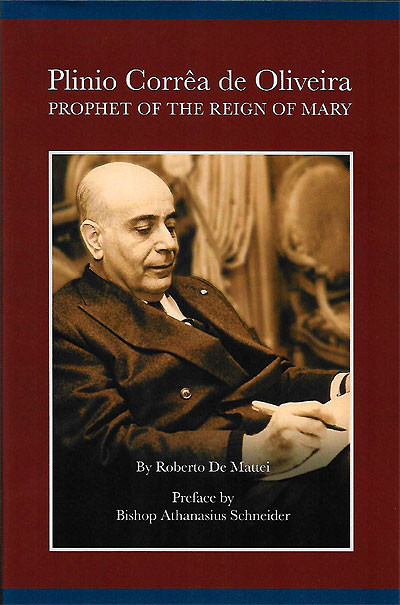
A Review of the Book:
Plinio Corrêa de Oliveira:
Prophet of the Reign of Mary
by Prof. Roberto de Mattei
Like many men of vision and foresight, some saints and prophets are only fully appreciated after they die. Such is the case with Prof. Plinio Corrêa de Oliveira whose life spanned the tumultuous twentieth century. During his early years, he reached the pinnacle of influence in political, social and religious spheres in Brazil. Because of his solid Catholic views, he was ignored by the major media and liberal establishment for the remainder of his extraordinary life. This silence was only broken when his enemies resorted to calumny and slander directed not only at his person but also the organization he founded, the Brazilian Society for the Defense of Tradition, Family and Property (TFP).
However, Prof. Plinio (as he was affectionately known by his followers) continues to exercise an enormous influence on our modern world. He not only opposed the errors of his time but more importantly founded a unique school of thought which continues his work to our days. This legacy is highlighted by the recent release of the English edition of the book, Plinio Corrêa de Oliveira: Prophet of the Reign of Mary by Italian scholar Prof. Roberto de Mattei.
How Plinio Corrêa de Oliveira Changed My Worldview Forever
The term, “prophet,” in the title might be a bit enigmatic. Most people understand a prophet as someone who merely foretells the future. However, another characteristic of prophets is an ability to discern the will of God in history and lead humanity in that direction. “He announces a punishment,” Prof. de Mattei explains, “not necessarily by divine revelation but because he understands how certain human forms of behavior inevitably lead to divine punishment.” This prophetic discernment is precisely what Prof. Plinio practiced throughout his life.
He defined the great enemy of our times as the Revolution, a long historical process against Christendom, which he masterfully explains in the book Revolution and Counter-Revolution. Prof. de Mattei likened this book to the City of God by Saint Augustine. Whereas the latter was a “meditation on the sunset of the Roman Empire,” the former “can be seen as a meditation on the decline of Christian civilization.”
Because mankind did not resist this Revolution, Prof. Plinio foretold a coming Divine chastisement and finally the splendid victory of Our Lady. Like the great Saint Louis de Montfort, he called this era of peace, the Reign of Mary. In fact, Prof. Plinio developed this perspective before he learned about the prophecy of Our Lady of Fatima that spoke of the eventual triumph of Her Immaculate Heart. Thus, Prof. de Mattei demonstrates his subject’s prophetic insights to the reader.
Learn All About the Prophecies of Our Lady of Good Success About Our Times
Prof. Plinio’s profound thoughts came from an intellectual life, which was not simply an accumulation of doctrine obtained through books. His wisdom also came from a comparison of his constant reflections with what he saw around him. However, he never claimed to have a monopoly on this method.
“I maintain,” he said, “that we are by far our own best book. We are not [just one] book; each of us is a library that contains immensely more than libraries with books. Never has anyone written all that can exist in a person’s mind.”
This way of living and thinking was the result of the virtue of calm, about which Prof. Plinio frequently lectured. His tranquil disposition facilitated his discernment of the good, true and beautiful. This, in turn, allowed him to see and reject its opposite. More often than not, this rejection entailed a profound understanding of Revolutionary errors that were concealed in their “veiled and embryonic forms.”
Plinio Corrêa de Oliveira: Distinguished Apostle, Ardent and Intrepid Polemist
Prof. de Mattei exemplifies this perception of error with the expression, white heresy. Prof. Plinio coined this term to describe a heresy not in the strict sense of the word but rather a sentimental, romantic idea of the Catholic religion where “virtue is conceived as something alien to heroism.” This concept is easily recognizable in the numerous depictions of the saints as soft, rosy-cheeked individuals of weak will and little suffering.
The historical embodiment of this unheroic spirit was Monsignor Jacques-André Emery who lived during the time of the French Revolution. Prof. Plinio noted how this cleric was often imprisoned with saintly nobles. Many of them heroically faced the guillotine and died martyrs’ deaths for their refusal to sign the “liberté-égalité” oath which this “holy” priest counseled them to take. Prof. Plinio dubbed this tendency to compromise, the “white heresy mindset,” which “spread the mentality of conciliation and concessions that tend to subordinate the Church to the world.” Msgr. Emery survived the bloody terror, and his pacifist “heresy” served to lull to sleep those who would have otherwise been disposed to fight against the advance of the Revolution.
Plinio Corrêa de Oliveira: Wisdom and Discernment in the Fight
The opposite of this deformed version of Catholicism was that practiced by the medieval knight, especially those who made up the orders of chivalry of that time. These monk-warriors represented the ideal human type because they molded themselves after the example of Our Lord Jesus Christ. Their manly piety attracted Prof. Plinio since it contrasted with the feminization of religion so prevalent in the world today.
Prof. de Mattei explains how these warriors embodied the Plinian spirituality, which was both combative and chivalrous. The mixture of militancy with courtesy might seem a contradiction at first glance. It might be better understood by relishing the beautiful custom of these manly warriors at Mass during the reading of the Gospel. Full of Catholic fervor, they would draw their swords and hold them on high until the end of the sacred reading. That gallant attitude meant, “If the Gospel needs to be defended, here we are!”

Like a knight of old, Prof. Plinio devoted his life to fighting in defense of the Catholic Church and Christian civilization with the same spirit of readiness. Prof. Plinio’s knightly way of living and intransigent opposition to the errors of the Revolution is what most led to his rejection by those who preferred to make continual concessions. Thus, the twentieth-century arbitrators of prestige made sure the spotlight never fell on him.
Sadly, he died on October 3, 1995, without seeing the establishment of the Reign of Mary for which he longed so much. Nevertheless, he accepted the will of Our Lady and passed tranquilly from this Earth because he had the certainty that one day, she would be victorious.
Plinio Corrêa de Oliveira: Man of Faith and Action
His devotion to Saint Joan of Arc reflected his hopes for the future. She continued to believe in the mission she received from heavenly voices in the face of apparent defeat. Prof. Plinio encouraged his followers never to lose hope in the victory of the Counter-revolution. He often recalled the Maid of Orlean’s dying words, “The voices didn’t lie, the voices didn’t lie!”
Plinio Corrêa de Oliveira: Prophet of the Reign of Mary is a very important read for those seeking a role model to help them face the Revolution in their respective lives and navigate the turbulent waters of our twenty-first century. More importantly, it supplies priceless principles for those wishing to be students in this counter-revolutionary intellectual and spiritual school.
